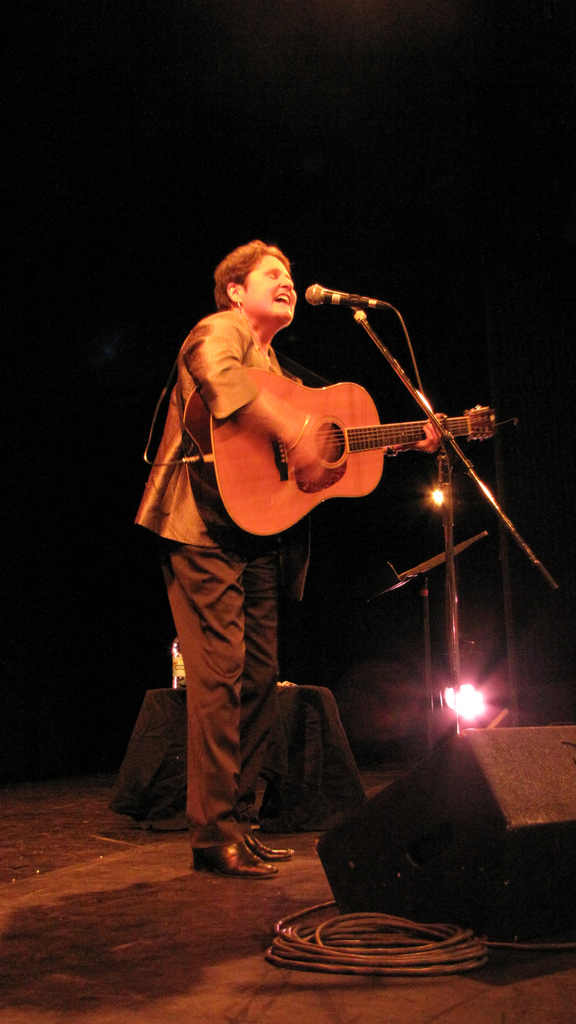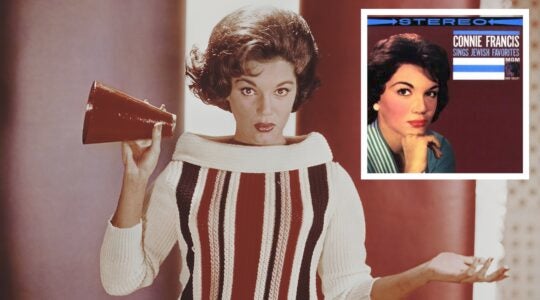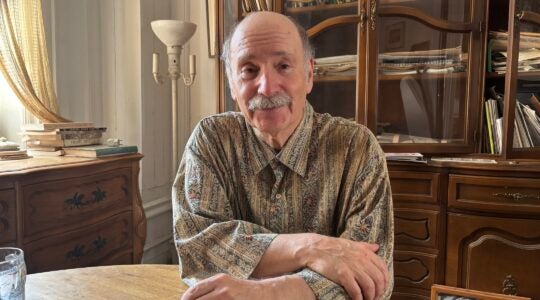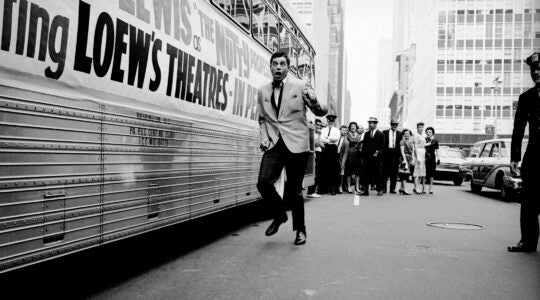
Debbie Friedman (debbiefriedman.com)
SAN FRANCISCO (JTA) — Over the weekend, as singer-songwriter Debbie Friedman lay dying in a hospital bed in Southern California, the call went out to Jewish congregations around the world to pray for the popular musician.
But early Sunday morning Friedman, who composed “Mi Shebeirach,” a popular version of the Jewish prayer for healing, was unable to find healing herself. Friedman died after years of suffering from an undisclosed illness at age 59. The funeral will be held at 11 a.m. Tuesday at Temple Beth Sholom in Santa Ana, Calif.
“One of the blessings that Debbie gave us” was helping people understand that the “healing of the body is something somewhat distinct from the healing of the soul,” said Rabbi Jacqueline Koch Ellenson, director of the Women’s Rabbinic Network, at the start of a memorial Sunday night at the Manhattan JCC just hours after the singer’s death.
Hundreds turned out to mourn Friedman in an event originally planned as a prayer gathering for her recovery from illness.
Friedman transformed Jewish worship in hundreds, if not thousands of North American synagogues, with her sing-along style of folk-inspired music that brought prayer home to liberal Jews who had never felt its power. Within minutes of her death, the guestbook on her website began to overflow with outpourings of love and grief from her fans around the world.
For a generation of baby boomers raised on rock, folk and soul, this diminutive woman with the big guitar bridged the Old World and the New, bringing the ancient liturgy alive for those who could not always connect to traditional cantorial music, Charles Passy blogged at The Wall Street Journal.
“Were it not for Debbie, Reform and Progressive Jews would not have discovered the connection between prayers and healing,” read the eulogy sent out by the World Union for Progressive Judaism. “While Reform worship was once characterized by organs and choirs, Debbie taught us to sing as communities and congregations. The guitar became a sacred instrument in her hands and she opened our hearts and souls to the joy of communal song.”
Born in Utica, N.Y., Friedman started as a group song leader in the Reform movement’s Olin-Sang-Ruby Union summer camp in Wisconsin the early 1970s, where she set Jewish liturgy to her own contemporary melodies.
Her first album, “Sing Unto God,” was released in 1972, followed by 19 more over the next three decades. Her most well-known composition, “Mi Shebeirach,” a Hebrew-English version of the Jewish prayer for healing, is sung in synagogues around the world, often by those who don’t realize its provenance.
“The issue is whether we’re reaching people and helping them pray,” Friedman told JTA in 2007. “Whatever we can do to facilitate their worship experience and spiritual self-exploration, we’re obligated to do.”
Despite the popularity of her music, Friedman was an outsider in the Jewish musical establishment for most of her life. Not only did Friedman have no cantorial training, she never finished college. And she long faced resistance from cantors, rabbis and others who considered her music inappropriate in synagogue.
“Musically she was untrained; her genius was intuitive and expressive,” said Cantor Jeff Klepper, a friend and fellow musician who first met Friedman at the Reform movement’s Camp Kutz in 1969. “She could see the musical talent in others and knew how to bring it out. She understood prayer and was able to teach it in a way you could understand. Singing with her was exhilarating in ways that words cannot express.”
Friedman was an early pioneer for gender-sensitive language, unafraid to use feminine forms of the Divine or alter masculine-only text references years before the liberal streams deemed it acceptable. She took Miriam as her prophetess, raising her voice to the unknown Jewish women throughout time, whose wisdom and patience she felt formed the bedrock of Jewish community.
“Today,” wrote Cantor Harold Messinger of Beth Am Israel in Penn Valley, Pa., “we can take for granted that these things happen: that we have a beautiful musical service each Friday night, that our children learn that ‘Lechi Lach/Lech Lecha’ applies equally to Abraham and Sarah, that the voice of the feminine in Jewish music is alive and vital.”
But, he wrote, “Debbie was the first, and every contemporary hazzan, song leader and layperson who values these concepts is in her debt.”
Friedman influenced a new generation of liberal rabbis and cantors who came of age with her music and have brought it with them into their congregations.
Rabbi Angela Warnick Buchdahl, a cantor at Central Synagogue in Manhattan who performed at the Sunday night event in Manhattan mourning Friedman, credited the late singer with helping her work through her own Jewish identity crisis.
“She had a strength and vulnerability about her that allowed people to unleash,” Warnick Buchdahl said. “She had this amazing ability to make people feel they had a connection with her, even after a short conversation.”
Her only regret about the Sunday service: It lacked even a touch of the late singer’s humorous side.
Friedman was “wickedly funny,” Warnick Buchdahl said, noting that sometimes in the most emotional moment of a concert, “Debbie would say something funny. She understood that laughter was one of the strongest ways to bring people together.”
Rabbi Jason Miller of Congregation T’chiyah in Detroit first heard her perform at a healing service at the Jewish Theological Seminary, where he was a rabbinical student in the 1990s.
“She stood at the front of the Seminary’s synagogue with her guitar while everyone danced around the room singing enthusiastically,” he wrote to the JTA. “The Seminary was not known as a very spiritual place at the time, but Debbie Friedman’s captivating music and her aura created so much ruach (spiritual energy) that day.”
In 2007, Friedman was tapped to teach at the Hebrew Union College-Jewish Institute of Religion’s School of Sacred Music, a position that confirmed her place in American Jewish musical history and gave her the formal approbation her fans felt she always had deserved.
“Her gifts were not always accepted with grace by the musical establishment, but the Jewish community voted with their voices and made her songs part of the mainstream of Jewish worship,” Rabbi Daniel Freelander, senior vice president of the Union for Reform Judaism, told JTA.
Despite the debilitating disease that kept her in near constant pain for the last decades of her life, Friedman was a frequent stage performer much in demand at Jewish events worldwide.
Audiences leapt to their feet and swayed with smiles on their faces when she raised her shining face and belted out one of their favorites, from her reworked version of “Sim Shalom” to the hard-driving, rock-influenced “Not By Might” or the powerful “Sing Unto God.”
Just two weeks before her death, Friedman gave her last live performance at Limmud UK for the 30th anniversary Limmud gathering at the University of Warwick in England. As usual, she gave it her all, said those who heard her.
A note Friedman posted on her website captures the spirit in Friedman that so many found inspiring.
“Sometimes life takes its turns into the unknown and presents us with challenges we would have preferred not to encounter. Suddenly we are confronted with our pain,” Friedman wrote. “Our pain need not bury us, instead it may elevate us to the point of healing — if we choose to allow it.
“Remember, out of what emerges from life’s painful challenges will come our healing. And ultimately, our greatest healing will come when we use our suffering to heal another’s pain — ‘to release another from their confinement.’ ”
(JTA Editor Ami Eden contributed to this obituary.)
JTA has documented Jewish history in real-time for over a century. Keep our journalism strong by joining us in supporting independent, award-winning reporting.






